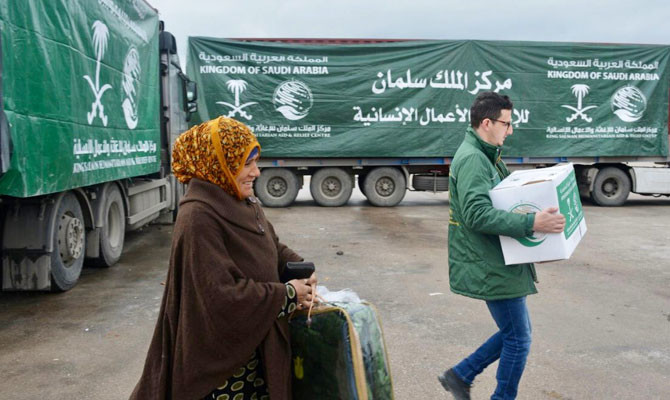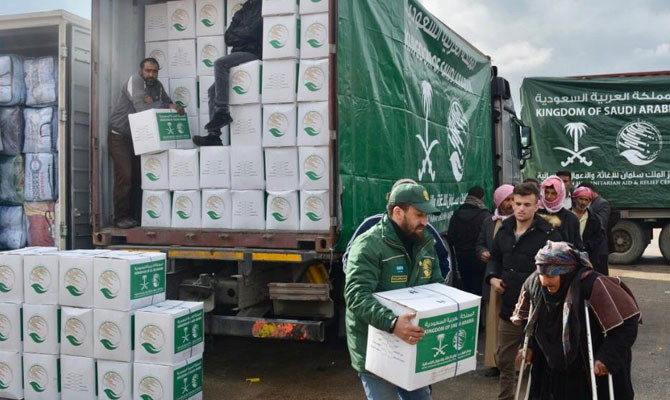JEDDAH: The King Salman Humanitarian Aid and Relief Center (KSRelief) helped 43 countries last year, a spokesman for the agency said Friday, as assistance to Yemen was stepped up.
Chalhoub bin Abdullah Chalhoub told a forum, titled “The intervention to alleviate the humanitarian crisis in the Muslim world,” in Cairo that the center provided assistance regardless of race, religion or nationality.
He said KSRelief sought to transfer its experience in relief and humanitarian work to Islamic countries and organizations.
Chalhoub said that the center’s assistance and promotion of humanitarian actions in Muslim countries come from a vision based on the Saudi pioneering role in relief and humanitarian action to convey Saudi values to the world.
In February alone the agency helped Syrian refugees in Jordan and Lebanon, Yemeni patients and internally displaced people in Nigeria.
Chalhoub was speaking on the sidelines of the first ever cultural and artistic festival organized by the Organization of Islamic Cooperation (OIC) titled “One nation and diverse cultures... Palestine in our heart.”
Other speakers at the symposium were KSRelief’s Dr. Yahya Al-Shammari, Hassan Abdel Moneim from the International Organization for Migration, Dr. Abeer Atifah of the World Food Programme and Osama Maher from the World Health Organization.
Delegates watched a documentary about Saudi relief and humanitarian efforts and the support provided to countries worldwide. There was also a presentation of statistics for countries benefiting from the Kingdom’s assistance.
As many as 2,501,897 Yemenis benefited from medical services provided by KSRelief in 2018, the Saudi Press Agency reported.
The aid was given on the directives of King Salman and Crown Prince Muhammed bin Salman.
The center is also actively involved in the rehabilitation of children affected by the war.
The program aims to help the children return to their normal lives, through teaching them and practicing different sports, as well as field trips. KSRelief plans to rehabilitate 2,000 children who were recruited by the Houthis.
A volunteer medical team from the agency has been performing open-heart surgeries and catheterizations in Yemen as part of a campaign ending Feb. 9. There have also been further deliveries of dialysis medication.
In the first six days of this campaign, the total number of operations conducted was 24 open-heart surgeries and 64 therapeutic catheterizations.
The father of one of the heart surgery patients brought his daughter from their home in Shabwa to Mukulla for treatment.
He said she had been suffering from heart issues for a long time but the family lacked the financial resources to get her the help she needed.
“We are so grateful for the generosity of KSRelief, which initiated this campaign, bringing hope to our family.”
Another parent also thanked the agency for its help, adding he had tried for eight years to find medical intervention for his son.


Saudi Arabia’s aid agency KSRelief at forefront of ‘global humanitarian effort’
Saudi Arabia’s aid agency KSRelief at forefront of ‘global humanitarian effort’

- Saudi Arabia’s relief agency extended help to 43 countries in 2018
- A volunteer medical team from the agency has been performing open-heart surgeries and catheterizations in Yemen as part of a campaign ending February 9
Saudi FM meets with UN humanitarian chief

- Areas of joint cooperation and ways to enhance it were discussed during the meeting
RIYADH: Saudi Foreign Minister Prince Faisal bin Farhan met with the Under-Secretary-General for Humanitarian Affairs and Emergency Relief Coordinator Tom Fletcher in Davos on Friday.
During the meeting which took place on the sidelines of the World Economic Forum, areas of joint cooperation and ways to enhance it were discussed, Saudi Press Agency reported.
© 2026 SAUDI RESEARCH & PUBLISHING COMPANY, All Rights Reserved And subject to Terms of Use Agreement.















